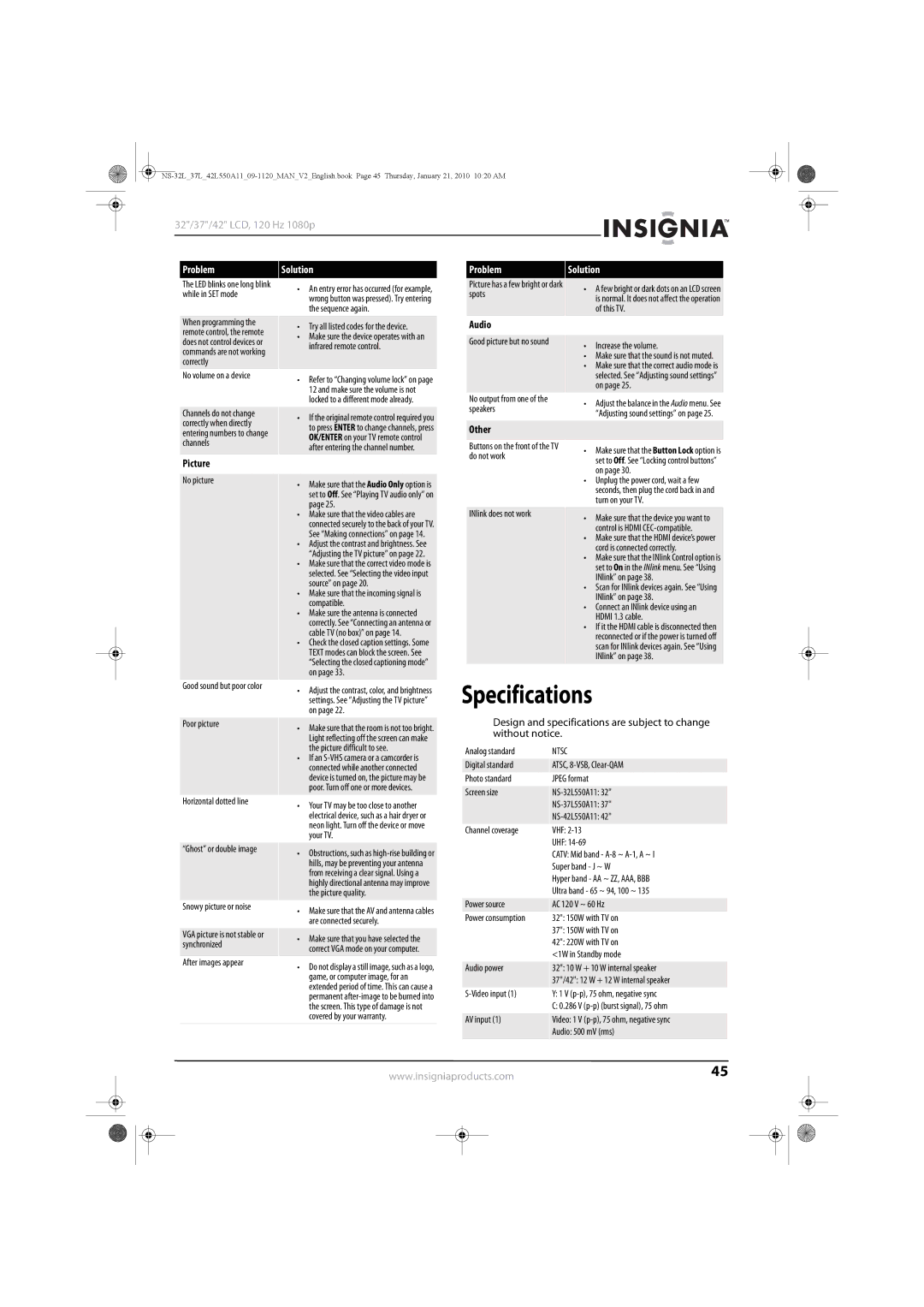
32"/37"/42" LCD, 120 Hz 1080p
Problem
The LED blinks one long blink while in SET mode
Solution
• An entry error has occurred (for example, |
wrong button was pressed). Try entering |
the sequence again. |
Problem | Solution | |
Picture has a few bright or dark | • A few bright or dark dots on an LCD screen | |
spots | ||
is normal. It does not affect the operation | ||
| ||
| of this TV. | |
|
|
When programming the remote control, the remote does not control devices or commands are not working correctly
No volume on a device
Channels do not change correctly when directly entering numbers to change channels
• Try all listed codes for the device. |
• Make sure the device operates with an |
infrared remote control. |
• Refer to “Changing volume lock” on page |
12 and make sure the volume is not |
locked to a different mode already. |
• If the original remote control required you |
to press ENTER to change channels, press |
OK/ENTER on your TV remote control |
after entering the channel number. |
Audio
Good picture but no sound
No output from one of the speakers
Other
Buttons on the front of the TV do not work
• Increase the volume. |
• Make sure that the sound is not muted. |
• Make sure that the correct audio mode is |
selected. See “Adjusting sound settings” |
on page 25. |
• Adjust the balance in the Audio menu. See |
“Adjusting sound settings” on page 25. |
• Make sure that the Button Lock option is |
Picture
No picture
• Make sure that the Audio Only option is |
set to Off. See “Playing TV audio only” on |
page 25. |
• Make sure that the video cables are |
connected securely to the back of your TV. |
See “Making connections” on page 14. |
• Adjust the contrast and brightness. See |
“Adjusting the TV picture” on page 22. |
• Make sure that the correct video mode is |
selected. See “Selecting the video input |
source” on page 20. |
• Make sure that the incoming signal is |
compatible. |
• Make sure the antenna is connected |
correctly. See “Connecting an antenna or |
cable TV (no box)” on page 14. |
• Check the closed caption settings. Some |
TEXT modes can block the screen. See |
“Selecting the closed captioning mode” |
on page 33. |
INlink does not work
set to Off. See “Locking control buttons” |
on page 30. |
• Unplug the power cord, wait a few |
seconds, then plug the cord back in and |
turn on your TV. |
• Make sure that the device you want to |
control is HDMI |
• Make sure that the HDMI device’s power |
cord is connected correctly. |
• Make sure that the INlink Control option is |
set to On in the INlink menu. See “Using |
INlink” on page 38. |
• Scan for INlink devices again. See “Using |
INlink” on page 38. |
• Connect an INlink device using an |
HDMI 1.3 cable. |
• If it the HDMI cable is disconnected then |
reconnected or if the power is turned off |
scan for INlink devices again. See “Using |
INlink” on page 38. |
Good sound but poor color
Poor picture
• | Adjust the contrast, color, and brightness |
| settings. See “Adjusting the TV picture” |
| on page 22. |
• | Make sure that the room is not too bright. |
| Light reflecting off the screen can make |
Specifications
Design and specifications are subject to change without notice.
Horizontal dotted line
“Ghost” or double image
Snowy picture or noise
VGA picture is not stable or synchronized
After images appear
the picture difficult to see. |
• If an |
connected while another connected |
device is turned on, the picture may be |
poor. Turn off one or more devices. |
• Your TV may be too close to another |
electrical device, such as a hair dryer or |
neon light. Turn off the device or move |
your TV. |
• Obstructions, such as |
hills, may be preventing your antenna |
from receiving a clear signal. Using a |
highly directional antenna may improve |
the picture quality. |
• Make sure that the AV and antenna cables |
are connected securely. |
• Make sure that you have selected the |
correct VGA mode on your computer. |
• Do not display a still image, such as a logo, |
game, or computer image, for an |
extended period of time. This can cause a |
permanent |
the screen. This type of damage is not |
covered by your warranty. |
Analog standard
Digital standard
Photo standard
Screen size
Channel coverage
Power source
Power consumption
Audio power
AV input (1)
NTSC
ATSC,
JPEG format
VHF:
UHF:
CATV: Mid band -
Hyper band - AA ~ ZZ, AAA, BBB Ultra band - 65 ~ 94, 100 ~ 135
AC 120 V ~ 60 Hz
32": 150W with TV on
37": 150W with TV on
42": 220W with TV on <1W in Standby mode
32": 10 W + 10 W internal speaker
37"/42": 12 W + 12 W internal speaker
Y: 1 V
C:0.286 V
www.insigniaproducts.com | 45 | |||
|
|
|
|
|
|
|
|
|
|
|
|
|
|
|
